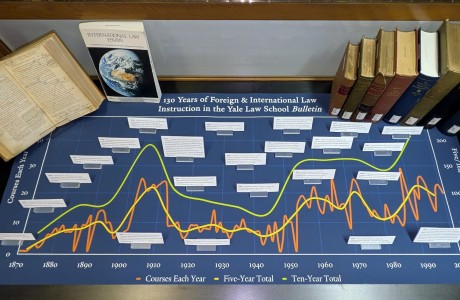The History of French Criminal Law
An interesting and informative display of books on the history of French Criminal Law is currently available in L1 of the Law Library.

The earliest beginnings of modern Criminal Law in France from the late Middle Ages to the early Renaissance is represented by the Trial of the Templars in the early 1300s and the Trial of Jeanne d'Arc just over a hundred years later. While the former is an example of a medieval law trial, we see the evolution from medieval to early modern law reflected in the proceedings of the latter.
A copy of L'esprit des lois, a treatise on political theory published in 1748 by Charles de Secondat, the Baron of Montesquieu, is on display. This work not only helped to establish the classical theory of criminal law in France but also greatly influenced many other European political writers. Also on view are publications of important cases from the 1800s to today that contributed to reforms in criminal law. These cases illustrate the ways in which change is brought about in areas of criminal law, such as religious tolerance, punishment and torture.
The evolution of the French criminal justice system is reflected in a series of jury trials from the French Revolution through to the twentieth century. More recently, the influence of modern forensics has greatly impacted the history of criminology all over the world, and in France, the case study of Joseph Vacher, The Killer of Little Shepherds, shows the adaptation of French criminal justice to embrace these new scientific methods.
Through this small compilation of publications, you get a clear and concise overview of the development of French Criminal Law in its many aspects, from the late Middle Ages to modern times. In addition to the display case in L1, an exhibit of the works of Joseph Lemard is about to be showcased in L2. Lemard utilizes cartoonish illustrations in juxtaposition to serious legal language to portray his views on French criminal law. Special thanks to Dustin Hooten who created this exhibit.

